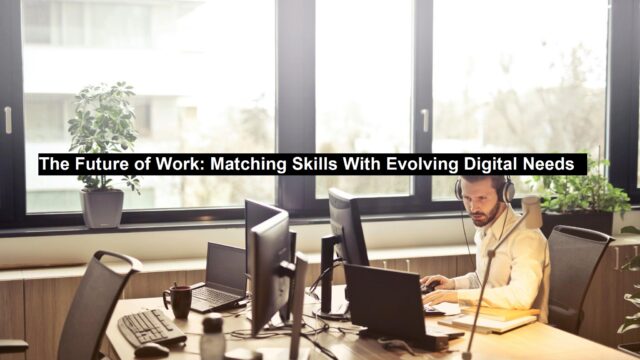The way we work is changing because of advancements in technology and data-driven processes. Therefore, we must also find new approaches to skill development.
Organizations must adapt by aligning their recruitment and workforce management strategies with this changing digital landscape. This article explores how businesses and employees alike can stay relevant in this era by adopting skills that meet the demands of emerging technologies and digital tools.
Embracing Technology In The Workplace
Just a decade ago, our workplaces were very different. We didn’t have artificial intelligence, for instance, and much of the technologies that run our world today like machine learning and big data were also in limited use.
But now, these technologies are part of employment workflows which has led traditional roles to evolve, creating a demand for new competencies. In the past, it was only tech companies that were using these technologies but now, healthcare, finance, education, retail, and many other industries require digital proficiency across a range of roles.
For companies, these shifts are not just about adopting new tools; they’re about fostering a workforce ready to leverage digital capabilities effectively. A critical part of this evolution is creating a talent strategy that prioritizes continuous skill development and adaptability, ensuring employees can seamlessly transition into roles that might not yet exist but will become vital in the years ahead.
Read: Shaping Bright Futures at Bethany High School
Building Digital Competencies For Modern Needs
Having competencies in areas like data literacy, cybersecurity, digital collaboration tools, and others is another set of skills that will continue to grow in demand as organizations embrace this new technology. One reason for this is that newer technologies also share data across several devices and ecosystems which requires workers to not only work with this data, but to also use it securely, ethically, and effectively.
The demand for cybersecurity, for instance, is soaring, with businesses facing heightened risks brought on by the interconnectivity of our world today. This means that an employee who can identify and respond to these cyber threats is likely going to future-proof their career better than one who might not have this skill.
Digital tools for project management like Jira and Trello or those for remote work collaboration like Slack and Zoom have also created flexibility in workflows but have also made it necessary for employees to learn how to use them so as to keep up with this flexibility.
Moreso, companies are now turning to IT recruitment strategies that address both immediate and future needs. They are increasingly looking for professionals with a solid grounding in modern technologies as a way to remain competitive while being more efficient. This forward-thinking approach means hiring with a view to skill flexibility, ensuring that employees can adjust as the workplace continues to shift.
Preparing The Workforce For Emerging Roles
There is no doubt that as technology advances, some jobs will become redundant while others will be created as a result – and this is already happening. For instance, automation frees up human workers from repetitive tasks but it will often push them into roles requiring strategic thinking, creativity, and problem-solving.
Areas that have adopted AI have seen a loss of some jobs but also created other jobs like data analysis and AI training. For companies with AI workflows, more emphasis will now be on seeking workers who can implement, monitor, and adjust AI systems to ensure ethical and effective operation.
Therefore, employees who can understand how future technologies will affect their work can begin preparing for and equipping themselves with the knowledge that will be required to fill the new jobs that will be created.

Redefining Flexibility And Remote Work Expectations
Covid-19 greatly changed our remote work expectations. Since then, flexibility has become a top priority for many employees and employers. Of course, this shift doesn’t come without its challenges, especially for employers who must address the technical and cultural changes needed to support remote work long-term, such as investing in digital infrastructure and training.
One role that has gained significant traction in the new remote working environment is that of the virtual assistant for property management. In property management, virtual assistants can streamline operations by handling administrative tasks, customer inquiries, and tenant communications from anywhere, allowing property managers to focus on strategic growth. Such roles underscore the importance of adaptable, digital-friendly job designs that suit remote environments.
Beyond property management, the broader workplace is also undergoing a cultural shift of its own, moving toward result-based evaluations rather than time-based tracking. In this shift, remote workers are judged on productivity and outcomes. Things like being able to meet deadlines matter more than the hours someone spends behind a screen. This has allowed employees to focus on work-life balance, which has reduced rates of burnout while attracting and retaining top-talent to get the work done.
Continuous Learning And Development
As an employee, you can no longer rely on formal education alone; instead, you must commit to continual upskilling if you care about career sustainability. Businesses must be active in facilitating this process by providing resources for training and development in the form of online courses, mentorship programs and more.
Today there are corporate learning platforms, virtual certifications, and industry-specific training programs that have made it easier than ever for employees and other professionals to develop skills needed in the modern workforce. Many other companies, especially those in the tech industry offer online boot camps or sponsor industry certification exams, recognizing that an investment in employee development yields long-term benefits for the organization as a whole.
The Future Workforce
The future of work will inevitably need tech-savvy, agile employees who can and are willing to adapt to change. For companies and organizations that want to remain relevant and competitive, they must embrace flexibility and give their employees a chance to grow. Employees must invest in skills like data analysis, cybersecurity, remote collaboration, and more as they prepare to face the challenges that lie ahead.
Growth and adaptability are the answers that will create effective employees and competitive businesses as technology keeps advancing.
Author’s Bio:
William Powell is a writer working with several recruiters and staffing agencies that includes IT recruitment. He enjoys learning about the latest business trends and analyzing how global events impact domestic and international economies.

